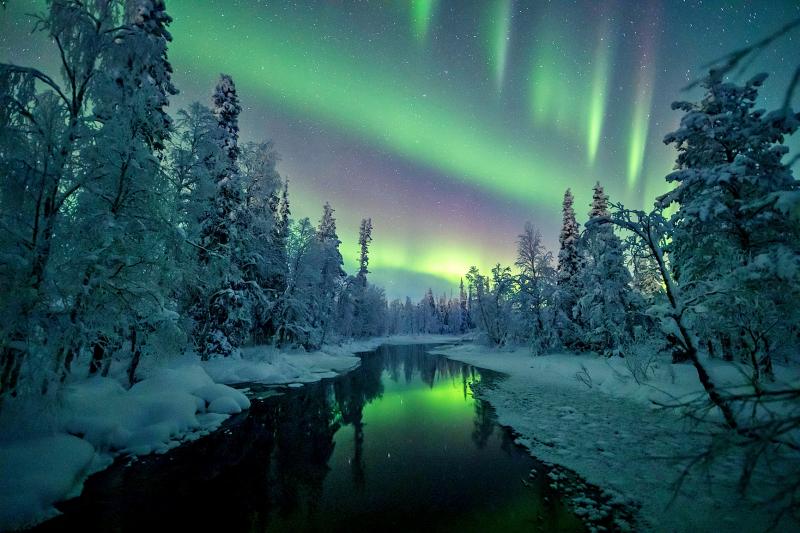A Taiwan-made space instrument installed on Japan’s scientific satellite Arase has helped researchers observe aurora formation at unexpectedly high altitudes, helping to advance understanding about space weather and communications systems on Earth, scientists said on Tuesday.
The Taiwanese-Japanese team detailed their findings in a paper titled “Active auroral arc powered by accelerated electrons from very high altitudes,” which was published in the journal Scientific Reports on Monday.
Scientists from National Cheng Kung University (NCKU) and Academia Sinica were in charge of the Low-Energy Particle Experiments-Electron Analyzer, one of the nine instruments on the satellite, enabling it to observe energy distribution and density of low-energy electrons surrounding the Earth.

Photo: Reuters
“This is the first time that Taiwan has manufactured such fine and high-resolution instrument for space measuring,” the university said in a news release.
Auroras are generated by electrons accelerated by a static electric field hitting the atmosphere, producing bright and elongated arcs in the nightside polar regions, Academia Sinica said.
Over the past 50 years, scientists had assumed that the electron acceleration takes places at altitudes of no more than 20,000km, but observations made through the Taiwan-made instrument found that it could occur at altitudes of up to 30,000km, it said.
The breakthrough not only overturns previous conception about the region of auroral formation, but generates new questions about how electrons work at higher altitudes, and might affect space weather, as well as communications and electrical systems on Earth, NCKU Institute of Space and Plasma Sciences professor Sunny Tam (談永頤) said.
While domestic studies on space weather mainly revolve around the ionosphere, Tam said that more attention should be paid to the magnetosphere.
Tam said that his team was in 2010 invited by Japan Aerospace Exploration Agency (JAXA) to join the satellite’s development.
Due to budgetary concerns, they later invited Academia Sinica to join the team, Tam said.
From 2010 until the satellite was launched in 2016, the university and Academia Sinica devoted nearly NT$30 million (US$1.06 million) to the instrument’s development, he added.
The funding was modest when compared with that of a major satellite project, but the outcome is precious, Tam said, describing the case as an example of optimal international cooperation of space technology that would usually need astronomical funds.
While Taiwan aspires to launch more satellites into space, it should overlook developing advanced scientific instruments in partnership with other countries, he added.
The satellite is operating at an orbit of 200km to 32,000km above ground, meaning their instrument has flown farther than any other Taiwanese instrument has done before, said Wang Shiang-yu (王祥宇), acting director of Academia Sinica’s Institute of Astronomy and Astrophysics.
That also means it has proved resistant to strong radiation and temperature differences of up to 200oC in space, he said.
The satellite, designed to serve for only one year, has operated for more than four years, he added.
As auroras can also be observed in other celestial bodies, the team’s findings would assist other efforts in space exploration, Wang said.
The Arase satellite, formerly known as the Exploration of Energization and Radiation in Geospace, is headed by JAXA, with NCKU and Academia Sinica being the only instrument team from outside of Japan.

An essay competition jointly organized by a local writing society and a publisher affiliated with the Chinese Communist Party (CCP) might have contravened the Act Governing Relations Between the People of the Taiwan Area and the Mainland Area (臺灣地區與大陸地區人民關係條例), the Mainland Affairs Council (MAC) said on Thursday. “In this case, the partner organization is clearly an agency under the CCP’s Fujian Provincial Committee,” MAC Deputy Minister and spokesperson Liang Wen-chieh (梁文傑) said at a news briefing in Taipei. “It also involves bringing Taiwanese students to China with all-expenses-paid arrangements to attend award ceremonies and camps,” Liang said. Those two “characteristics” are typically sufficient

A magnitude 5.9 earthquake that struck about 33km off the coast of Hualien City was the "main shock" in a series of quakes in the area, with aftershocks expected over the next three days, the Central Weather Administration (CWA) said yesterday. Prior to the magnitude 5.9 quake shaking most of Taiwan at 6:53pm yesterday, six other earthquakes stronger than a magnitude of 4, starting with a magnitude 5.5 quake at 6:09pm, occurred in the area. CWA Seismological Center Director Wu Chien-fu (吳健富) confirmed that the quakes were all part of the same series and that the magnitude 5.5 temblor was

The brilliant blue waters, thick foliage and bucolic atmosphere on this seemingly idyllic archipelago deep in the Pacific Ocean belie the key role it now plays in a titanic geopolitical struggle. Palau is again on the front line as China, and the US and its allies prepare their forces in an intensifying contest for control over the Asia-Pacific region. The democratic nation of just 17,000 people hosts US-controlled airstrips and soon-to-be-completed radar installations that the US military describes as “critical” to monitoring vast swathes of water and airspace. It is also a key piece of the second island chain, a string of

The Central Weather Administration has issued a heat alert for southeastern Taiwan, warning of temperatures as high as 36°C today, while alerting some coastal areas of strong winds later in the day. Kaohsiung’s Neimen District (內門) and Pingtung County’s Neipu Township (內埔) are under an orange heat alert, which warns of temperatures as high as 36°C for three consecutive days, the CWA said, citing southwest winds. The heat would also extend to Tainan’s Nansi (楠西) and Yujing (玉井) districts, as well as Pingtung’s Gaoshu (高樹), Yanpu (鹽埔) and Majia (瑪家) townships, it said, forecasting highs of up to 36°C in those areas